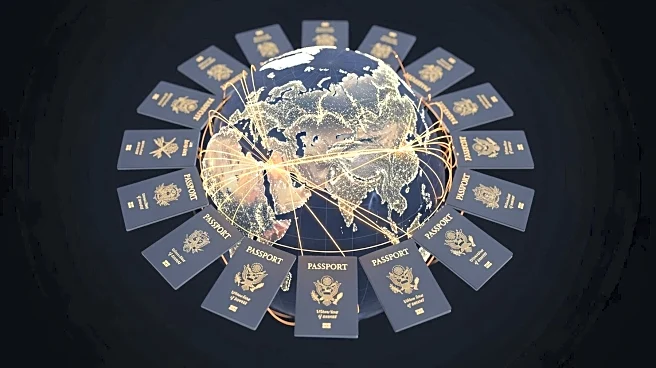What's Happening?
The United States has experienced a significant drop in the Henley Passport Index, falling out of the top ten most powerful passports for the first time in 20 years. The U.S. now ranks 12th globally, tied with Malaysia, offering visa-free access to 180
destinations. This decline is part of a broader trend observed in the index, which evaluates 199 passports based on visa-free access to 227 global destinations. The index is compiled using exclusive data from the International Air Transport Association (IATA). Singapore continues to lead the rankings with visa-free access to 193 destinations, followed by South Korea and Japan. Meanwhile, China has shown remarkable progress, climbing to 64th place with visa-free access to 82 destinations, surpassing the U.S. in the Henley Openness Index by offering visa-free entry to 76 countries.
Why It's Important?
The drop in the U.S. passport ranking could have implications for American travelers and the country's global mobility. A lower ranking may affect the ease with which U.S. citizens can travel internationally, potentially impacting tourism and business travel. This shift might also reflect changing geopolitical dynamics and the U.S.'s diplomatic relationships with other countries. As China continues to improve its global mobility, surpassing the U.S. in certain aspects, it may indicate a shift in global influence and openness. The rankings could influence how countries negotiate visa agreements and impact international relations, affecting industries reliant on global travel and tourism.
What's Next?
The U.S. may need to reassess its visa policies and diplomatic strategies to regain its position among the top ten most powerful passports. This could involve negotiating new visa-free agreements or improving existing ones to enhance global mobility for American citizens. Stakeholders such as travel agencies, airlines, and businesses involved in international trade may push for policy changes to facilitate easier travel. Additionally, the U.S. government might explore ways to strengthen its diplomatic ties to improve its passport ranking in future assessments.
Beyond the Headlines
The decline in the U.S. passport ranking may also reflect broader cultural and political shifts. As countries like China increase their global mobility, it could signal a change in international perceptions of openness and cooperation. This development might influence how the U.S. is viewed on the world stage, potentially affecting its soft power and cultural influence. The rankings could also prompt discussions on the balance between national security and global accessibility, as countries navigate the complexities of visa policies in an increasingly interconnected world.
















